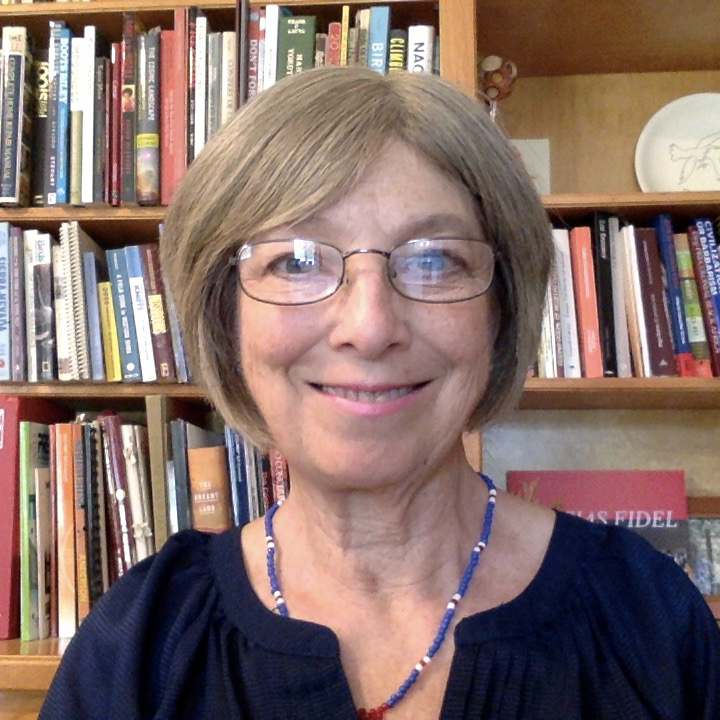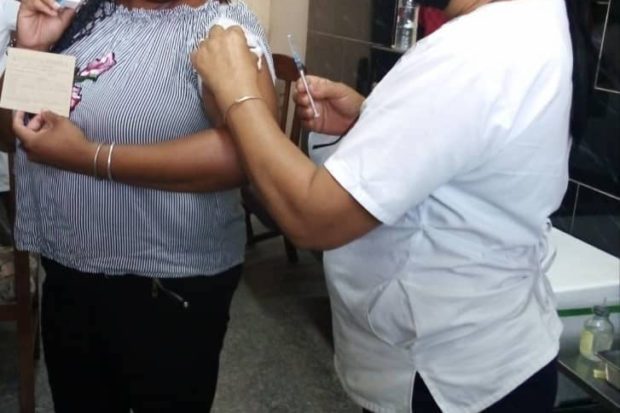
Cuba is vaccinating faster than any other country in the world, in terms of the percentage of population. Currently, more than 90% of vaccine-eligible people have had at least one dose and 63% are fully vaccinated with three doses. The plan is to get the tally beyond 90% fully immunized by the end of November. This is particularly impressive because Cuba is also vaccinating the pediatric population ages 2–18.
Where’d they get the vaccine?
How can Cuba vaccinate all the people when Haiti, nearby in the Caribbean, has a fully vaccinated rate of 0.2%? They made it! Cuba has developed its own vaccines, the only small or developing country to do so.
Cuba has a biotechnology sector that is unique in the world. It’s owned by the Cuban people—entirely state-owned and funded—not by venture or other capital, and thus is responsive to the needs of people and not profit.
The national health system is its first priority. Cooperation rather than competition is the functioning mode, with both an orientation toward Global South-South cooperation and collaboration among research institutions.
What’s the community attitude toward vaccination in Cuba?
A personal note: Years ago, long before the pandemic, I toured the pediatric hospital in Marianao with Dr. Lupe Guevara, a pediatrician and specialist in traditional and alternative medicine. I asked her about vaccine hesitancy in Cuba, figuring that she would know if anyone would. She looked at me, very puzzled, and said, “Naturally parents want what’s best for their children.”
Indeed they do, and what is best is more obvious when it is not confused by the profit motives of big pharma and the healthcare industry. It’s also clearer when media promotes popular education rather than ignorance and anti-science.
Cuba has a literate population that hasn’t had any reason to be afraid as a reliable primary care system, universally accessible and free of charge, has achieved childhood vaccination rates above 99%, and all Cubans are vaccine-protected against 13 diseases. Eight of those vaccines are made in Cuba; there’s a long history of vaccine production and use and vaccine safety.
(It’s a little-known fact that Cuba was the first country in the world to eliminate polio. In 1960, Dr. Albert Sabin published his results with the use of the oral vaccine, saying it could be used to eliminate polio from the world. The only country that took him up on it then was Cuba. In 1962, Cuba immunized more than 80% of all children in two week-long periods four weeks apart. In 1963, there was only one case of polio in Cuba, and in 1964 and after, there were none.)
What about anti-COVID vaccines for children? How is that possible?
Again, Cuba’s own biotechnology sector has been producing vaccines for children for a long time. The Cuban vaccines are not mRNA vaccines; they are sub-unit vaccines, built on the same platforms as preexisting vaccines, conjugating the spike protein of the SARS-CoV-2 virus with inactivated tetanus toxin in the case of Soberana 02, whereas Abdala builds on the same platform as Cuba’s hepatitis B vaccines, in use now for more than 25 years.
Can we believe the numbers?
For 2020, Cuba maintained low numbers of Covid infections through public health measures alone. After the opening of the borders in January, even with attempted screening measures, imported infections spread widely into the community. At its height in August, the virus was infecting more than 9,000 Cubans per day. Now the rate is about one-fourth of that and falling daily. When the numbers were bad (bad by Cuban standards; even now, the United States has about three times as many Covid-19 deaths per million people compared to Cuba), the Cuban Ministry of Health published them daily in the press, and they still do now that they are better.
And the blockade
In 2020, the Department of Transportation denied two U.S. cargo flights scheduled to deliver humanitarian aid to Cuba—including food, medicine and medical supplies—because it was not “in the foreign policy interests of the United States.”
The UN Special Rapporteur on the negative impact of unilateral coercive measures on the enjoyment of human rights issued a report condemning the U.S. embargo against Cuba, noting in particular that Swiss companies could not ship medical equipment to Cuba after being acquired by a U.S. company and that Swiss humanitarian organizations could not transfer money for medical collaborations and support in Cuba as a result of the extraterritorial application of the embargo.
The United States claims that exports of medicines or medical supplies to Cuba shall not be restricted—which is patently untrue—except in a case in which the item could be used in the production of any biotechnological product. This includes the production of medicines and vaccines.
What about dissent?
It’s important to be able to distinguish between a popular protest and a U.S.-inspired coup attempt.
Yes, I’m aware that demonstrations were planned for Nov. 15 and that the Cuban government denied a permit for them. These are being sold to the U.S. public as peaceful demonstrations, but it’s clear that the ultimate goal is to destabilize Cuba to a point where U.S. military intervention is possible.
That doesn’t mean that there might not be legitimate dissent in Cuba. How will we ever know, as long as the United States finances astroturf “dissent” to the tune of millions? Every year, the U.S. authorizes at least $20 million, primarily through the U.S. Agency for International Development (USAID), to individuals, groups and organizations based in Florida and Cuba for “democracy activities.”
Also, a big media blast about Cuba holding Defense Days starting on Nov. 20 will be evident, trying to maintain that this is a response to the planned “protests.” In fact, Cuba does this yearly in November—except last year due to the pandemic.
I’m often in Cuba in November, and I can remember thinking once how tired I was of “all the militarism on TV” and then reflecting what an arrogant response this was for a visitor in a country that has had to defend itself for more than 60 years against the United States, the country where I vote and pay taxes, which has actually carried out an armed invasion of Cuba, as well as a blockade that is defined as an act of war.
*****
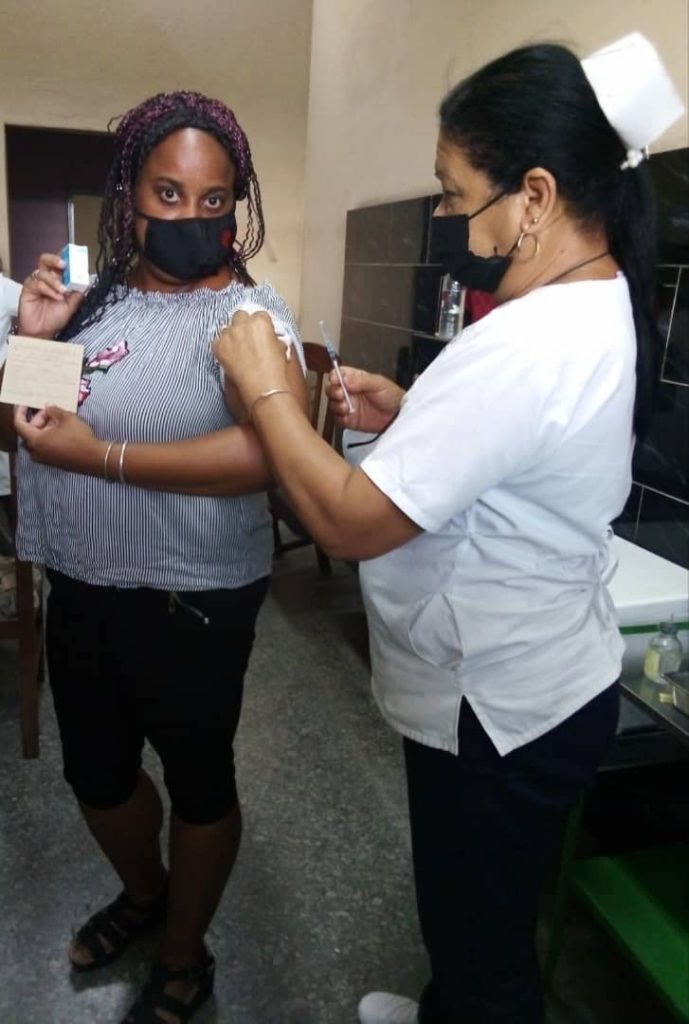
Cuba’s immunization program is in high gear. Photo courtesy of Yoamaris Neptuno Dominguez (shown in photo getting vaccinated)
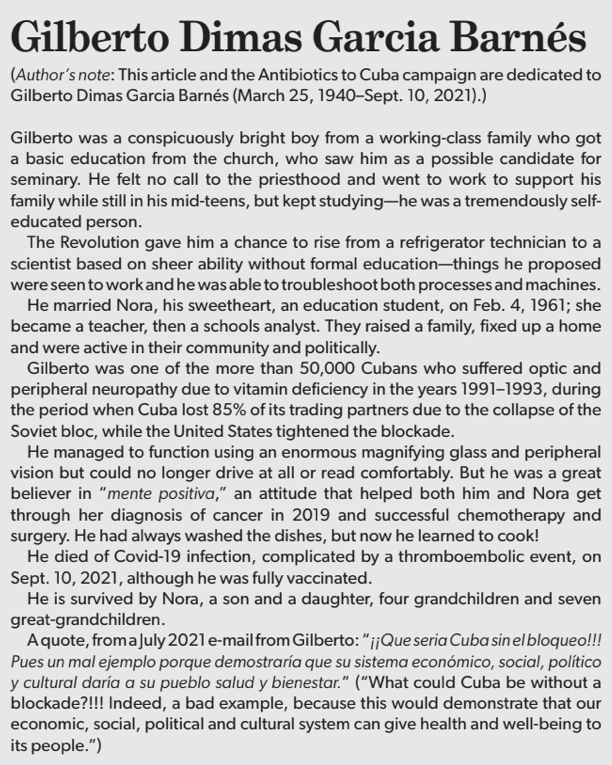
(Author’s note: This article and the Antibiotics to Cuba campaign are dedicated to Gilberto Dimas Garcia Barnés (March 25, 1940–Sept. 10, 2021).)
Gilberto was a conspicuously bright boy from a working-class family who got a basic education from the church, who saw him as a possible candidate for seminary. He felt no call to the priesthood and went to work to support his family while still in his mid-teens, but kept studying—he was a tremendously self-educated person.
The Revolution gave him a chance to rise from a refrigerator technician to a scientist based on sheer ability without formal education—things he proposed were seen to work and he was able to troubleshoot both processes and machines.
He married Nora, his sweetheart, an education student, on Feb. 4, 1961; she became a teacher, then a schools analyst. They raised a family, fixed up a home and were active in their community and politically.
Gilberto was one of the more than 50,000 Cubans who suffered optic and peripheral neuropathy due to vitamin deficiency in the years 1991–1993, during the period when Cuba lost 85% of its trading partners due to the collapse of the Soviet bloc, while the United States tightened the blockade.
He managed to function using an enormous magnifying glass and peripheral vision but could no longer drive at all or read comfortably. But he was a great believer in “mente positiva,” an attitude that helped both him and Nora get through her diagnosis of cancer in 2019 and successful chemotherapy and surgery. He had always washed the dishes, but now he learned to cook!
He died of Covid-19 infection, complicated by a thromboembolic event, on Sept. 10, 2021, although he was fully vaccinated.
He is survived by Nora, a son and a daughter, four grandchildren and seven great-grandchildren.
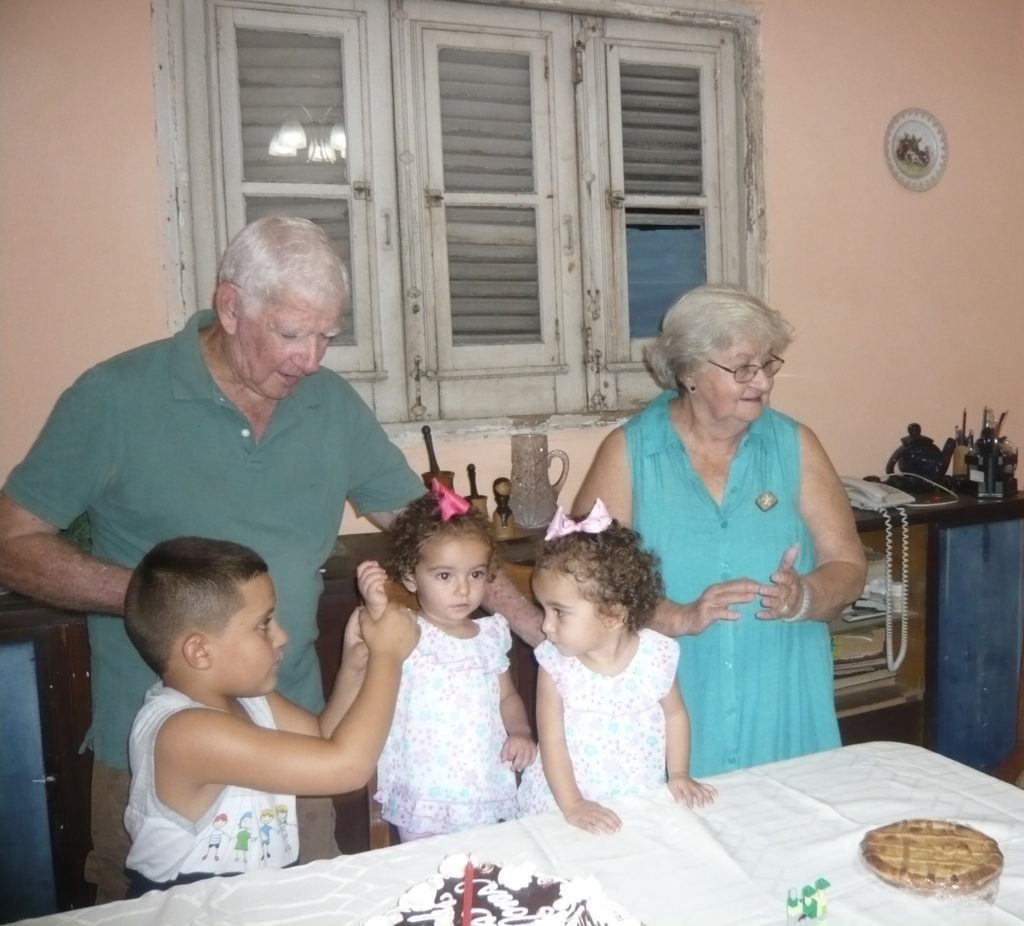
A quote, from a July 2021 e-mail from Gilberto: “¡¡Que seria Cuba sin el bloqueo!!! Pues un mal ejemplo porque demostraría que su sistema económico, social, político y cultural daría a su pueblo salud y bienestar.” (“What could Cuba be without a blockade?!!! Indeed, a bad example, because this would demonstrate that our economic, social, political and cultural system can give health and well-being to its people.”)

